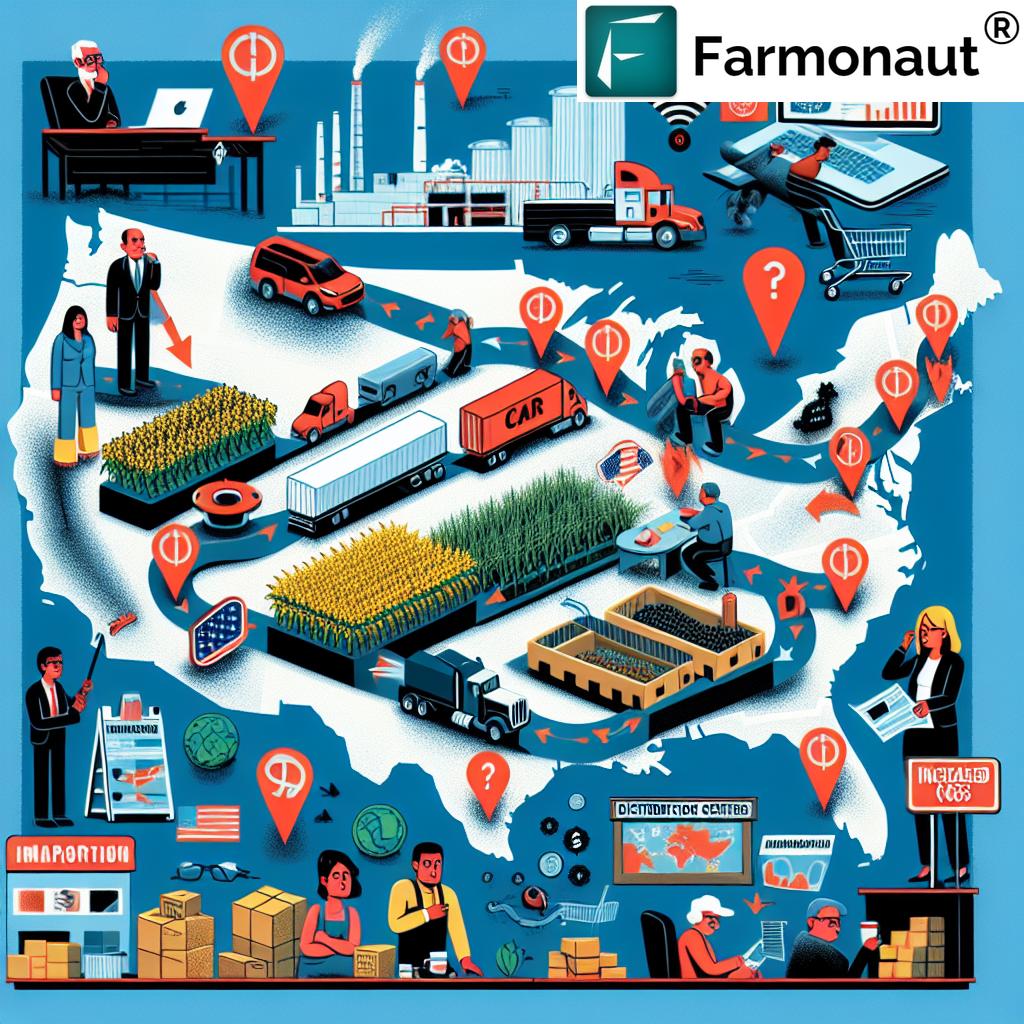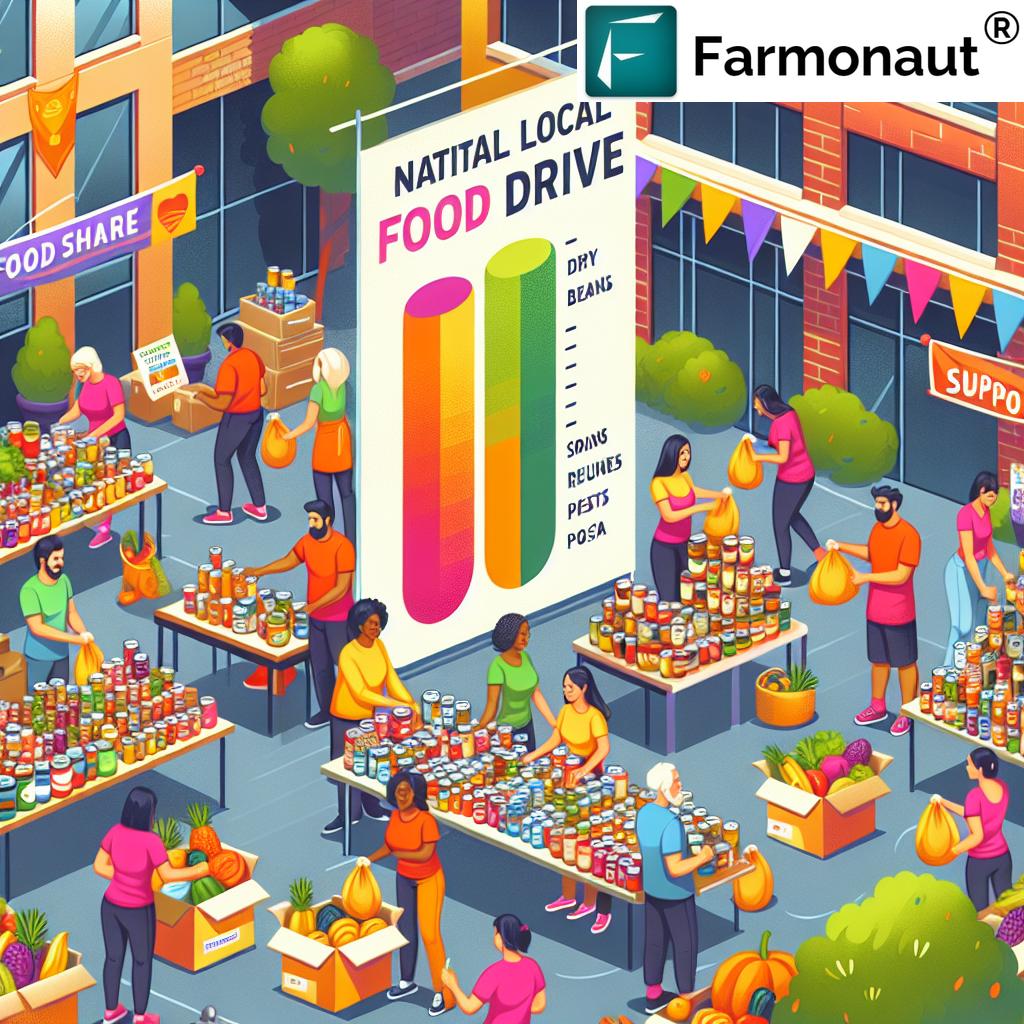Economic Impact of Tariffs: How Atlanta Businesses and Consumers Face Rising Costs and Market Uncertainty
“Tariffs on imported goods can increase consumer prices by up to 25%, affecting everyday purchases for Atlanta residents.”
In recent months, the economic landscape of Atlanta and the broader United States has been significantly altered by the implementation of sweeping tariffs. As a team of economic analysts and agricultural experts, we at Farmonaut have been closely monitoring these developments and their far-reaching consequences for businesses and consumers alike. In this comprehensive analysis, we will delve into the complex web of economic impacts stemming from these tariffs, with a particular focus on how they affect Atlanta’s diverse business ecosystem and consumer base.
The Ripple Effect of Tariffs on Atlanta’s Economy
The introduction of tariffs has sent shockwaves through various sectors of Atlanta’s economy, creating a ripple effect that touches nearly every aspect of business and consumer life. From small businesses to large corporations, the impact is being felt across the board, leading to rising costs, market uncertainty, and potential shifts in consumer behavior.
- Small businesses facing increased costs for imported materials
- Auto industry grappling with higher prices for parts and vehicles
- Agricultural sector bracing for potential export challenges
- Consumers preparing for price hikes on everyday goods
As we explore these effects in detail, it’s crucial to understand that the full economic impact of tariffs may take months to fully materialize. However, the initial signs point to significant challenges ahead for Atlanta’s business community and consumers.
Small Businesses: The Frontline of Tariff Impact
In Georgia, where more than 99% of businesses are classified as small according to the U.S. Small Business Administration, the impact of tariffs is particularly acute. Many of these businesses rely heavily on imported materials to keep their costs low and remain competitive. With the introduction of tariffs, these small enterprises are now facing a difficult choice: absorb the increased costs or pass them on to consumers.
Tom Smith, a finance and economic professor at Emory University, notes, “Well, if they were cheaper to buy in the U.S., they would have already bought them from the U.S.” This astute observation highlights the limited options available to small business owners in the face of rising import costs.
For Atlanta’s small businesses, the tariffs present a multifaceted challenge:
- Increased costs for raw materials and supplies
- Potential need to restructure supply chains
- Pressure to raise prices, potentially affecting customer loyalty
- Uncertainty in long-term planning and investment decisions
These challenges are particularly daunting for businesses operating on thin profit margins, where even small cost increases can have significant impacts on overall viability.

The Auto Industry: Navigating Uncertain Waters
“The auto industry, representing 3% of US GDP, faces significant disruption due to rising costs from trade tariffs.”
The automotive sector, a crucial component of both Atlanta’s and the national economy, is facing unprecedented challenges due to the tariffs. Dealerships, in particular, are at the forefront of these changes, with concerns about how rising costs will affect sales and consumer behavior.
David Kelleher, a car dealer from Philadelphia, expresses the uncertainty felt across the industry: “There’s a lot of fear, a lot of confusion, and a lot of angst among myself and dealers.” This sentiment is echoed by dealerships in Atlanta and across the country.
Key issues facing the auto industry include:
- Higher costs for imported parts, potentially leading to more expensive vehicles
- Uncertainty about inventory management and pricing strategies
- Potential shifts in consumer preferences towards domestic or lower-cost vehicles
- Long-term concerns about industry competitiveness and innovation
The impact on the auto industry extends beyond dealerships, affecting manufacturers, suppliers, and auxiliary industries that depend on automotive production and sales. This interconnectedness means that tariff-induced disruptions in the auto sector could have far-reaching consequences for Atlanta’s broader economy.
Agricultural Economy: Crops of Uncertainty
Agriculture, a key driver of local economies across Georgia, is particularly vulnerable to the effects of tariffs. Farmers, already facing challenges from weather unpredictability and market fluctuations, now confront additional uncertainties related to export markets and input costs.
U.S. Secretary of Agriculture Brooke Rollins acknowledges the potential for significant impact: “We don’t know what those consequences will be. In fact, it may be months before we really know — especially in the row crops.” This uncertainty is causing concern among farmers and agricultural businesses throughout the state.
For Atlanta’s agricultural sector, the tariffs pose several challenges:
- Potential loss of export markets due to retaliatory tariffs
- Increased costs for agricultural equipment and supplies
- Uncertainty in crop planning and investment decisions
- Possible need for government support programs to mitigate financial strain
The agricultural economy’s health is crucial not only for rural communities but also for Atlanta’s food processing and distribution industries. Any disruptions in this sector could have cascading effects throughout the region’s economy.
Consumer Impact: The Ripple Effect on Everyday Life
As businesses grapple with the effects of tariffs, consumers in Atlanta and beyond are bracing for potential price increases on a wide range of goods. From groceries to electronics, the impact of tariffs is expected to be felt across various consumer sectors.
The law of demand, as explained by Professor Smith, remains in play: “As prices go up, people buy fewer things. The quantity of demand goes down.” This basic economic principle underscores the potential for significant shifts in consumer behavior as a result of tariff-induced price increases.
Potential impacts on consumers include:
- Higher prices for everyday goods, including groceries and household items
- Increased costs for big-ticket purchases like cars and appliances
- Potential changes in shopping habits and brand preferences
- Reduced purchasing power, particularly for lower-income households
These effects could lead to broader economic consequences, including reduced consumer spending and potential impacts on inflation rates.
Market Uncertainty and Investor Response
The implementation of tariffs has not only affected businesses and consumers but has also sent ripples through financial markets. Wall Street has responded with volatility, with the stock market experiencing significant declines following the tariff announcements.
Investors are reevaluating their strategies in light of potential impacts on corporate profits and overall economic growth. As Professor Smith points out, “Why would you want to invest in a company if their profit margins are going to go down in the next year? You wouldn’t — you’d shy away. That’s why the market is taking a beating.”
Key considerations for investors include:
- Reassessment of investment portfolios to account for tariff-related risks
- Increased focus on companies with strong domestic supply chains
- Potential shift towards sectors less affected by international trade disputes
- Heightened attention to government policies and trade negotiations
This market uncertainty adds another layer of complexity to Atlanta’s economic landscape, potentially affecting everything from retirement savings to business investment decisions.

Government Response and Support Programs
In response to the potential economic consequences of tariffs, government agencies are preparing support programs, particularly for sectors like agriculture that may be disproportionately affected. Secretary Rollins has indicated that infrastructure is being set up to address potential short-term economic consequences for farmers and ranchers.
These government initiatives may include:
- Financial support programs for affected industries
- Trade assistance packages for farmers facing export challenges
- Guidance and resources for businesses navigating the new trade landscape
- Potential policy adjustments to mitigate negative economic impacts
While these programs aim to provide a safety net, their effectiveness and long-term implications remain to be seen. Businesses and consumers in Atlanta will need to stay informed about available support and how to access it.
Long-Term Economic Implications
As Atlanta’s businesses and consumers navigate the immediate impacts of tariffs, it’s crucial to consider the potential long-term economic implications. The tariffs could lead to significant shifts in global trade patterns, supply chain structures, and economic relationships.
Possible long-term effects include:
- Restructuring of global supply chains to reduce dependence on tariff-affected goods
- Shifts in industrial competitiveness between nations
- Changes in foreign investment patterns
- Potential for new trade agreements and economic partnerships
These long-term implications could fundamentally alter Atlanta’s economic landscape, presenting both challenges and opportunities for businesses and workers in the region.
Adapting to the New Economic Reality
As Atlanta’s businesses and consumers face the challenges posed by tariffs, adaptation and innovation will be key to navigating this new economic landscape. Companies may need to explore new strategies to remain competitive, such as:
- Diversifying supply chains to reduce reliance on tariff-affected goods
- Investing in technology and automation to offset increased labor costs
- Exploring new markets and product lines to maintain profitability
- Collaborating with industry partners to share resources and knowledge
For consumers, adapting to this new reality may involve:
- Becoming more price-conscious and exploring alternative products
- Supporting local businesses to help strengthen the local economy
- Staying informed about economic trends and policy changes
- Adjusting budgets and financial planning to account for potential price increases
In this challenging economic environment, tools and technologies that provide data-driven insights can be invaluable for businesses and policymakers. For instance, Farmonaut’s carbon footprinting services can help agricultural businesses monitor and reduce their environmental impact, potentially offsetting some of the economic pressures caused by tariffs. Similarly, our product traceability solutions can assist businesses in optimizing their supply chains and ensuring compliance with evolving trade regulations.
The Role of Technology in Mitigating Tariff Impacts
As businesses in Atlanta and beyond grapple with the challenges posed by tariffs, technology emerges as a crucial tool for adaptation and resilience. Advanced solutions can help companies optimize their operations, make data-driven decisions, and explore new opportunities in a changing economic landscape.
For instance, in the agricultural sector, which is particularly vulnerable to trade uncertainties, technologies like those offered by Farmonaut can provide valuable support. Our satellite-based crop health monitoring and AI-driven advisory systems can help farmers optimize their resource use and improve yields, potentially offsetting some of the financial pressures caused by tariffs.
Key technological solutions for businesses include:
- Advanced data analytics for market trend analysis and forecasting
- Supply chain management software for optimizing logistics and inventory
- AI-powered decision support systems for strategic planning
- Blockchain-based solutions for enhancing supply chain transparency and efficiency
These technologies can provide businesses with the agility and insights needed to navigate the complex economic environment created by tariffs. For example, our fleet management solutions can help agricultural businesses optimize their logistics operations, potentially reducing costs in the face of tariff-induced price pressures.
Comparative Impact of Tariffs on Key Industries
| Industry | Estimated Cost Increase (%) | Supply Chain Disruption Level | Consumer Impact |
|---|---|---|---|
| Small Businesses | 10-20% | High | Higher prices on various goods, potential loss of local businesses |
| Auto Industry | 15-25% | High | Increased vehicle prices, reduced model choices |
| Agriculture | 5-15% | Medium | Higher food prices, potential reduced variety of produce |
| Consumer Electronics | 10-30% | Medium | Higher prices on gadgets, potential delays in new product releases |
| Textile and Apparel | 10-20% | Medium | Increased clothing prices, potential shift in fashion trends |
The Path Forward: Balancing Trade and Economic Growth
As Atlanta and the nation grapple with the economic impact of tariffs, the path forward remains uncertain. The ultimate goal of these trade measures, as stated by the administration, is to level the playing field for American workers and correct long-standing trade imbalances. However, the short-term economic pain is evident, and the long-term benefits remain to be seen.
Key considerations for the future include:
- The potential for new trade negotiations and agreements
- The development of domestic industries to reduce reliance on imports
- The role of government support in mitigating economic impacts
- The importance of innovation and adaptation in the business community
As these developments unfold, it will be crucial for businesses, consumers, and policymakers to stay informed and adaptable. Tools like Farmonaut’s crop loan and insurance solutions can play a vital role in helping agricultural businesses manage financial risks in this uncertain environment.
Conclusion: Navigating Uncertainty with Resilience and Innovation
The economic impact of tariffs on Atlanta’s businesses and consumers is a complex and evolving situation. While the challenges are significant, they also present opportunities for innovation, adaptation, and growth. As we navigate these uncertain waters, it’s clear that collaboration, technological advancement, and strategic planning will be key to building a resilient and prosperous economy.
At Farmonaut, we remain committed to providing cutting-edge solutions that can help businesses, particularly in the agricultural sector, thrive in this changing landscape. Our satellite-based technologies and AI-driven insights offer powerful tools for optimization and decision-making in challenging times.
As Atlanta moves forward, the resilience and adaptability that have long characterized its business community will be crucial in turning these challenges into opportunities for growth and innovation.
FAQs
- How long are the tariffs expected to remain in place?
The duration of the tariffs is uncertain and depends on various factors, including trade negotiations and economic conditions. - Will all consumer goods be affected by price increases due to tariffs?
While not all goods will be directly affected, many products may see price increases due to higher costs of imported materials or components. - How can small businesses in Atlanta prepare for the impact of tariffs?
Small businesses can prepare by diversifying suppliers, optimizing operations, and exploring new markets or product lines. - Are there any sectors in Atlanta that might benefit from the tariffs?
Some domestic manufacturers may benefit if tariffs make their products more competitive against imports. - How might the tariffs affect Atlanta’s job market?
The impact on jobs will vary by sector, with some industries potentially seeing job losses while others may experience growth.
Earn With Farmonaut: Affiliate Program
Earn 20% recurring commission with Farmonaut’s affiliate program by sharing your promo code and helping farmers save 10%. Onboard 10 Elite farmers monthly to earn a minimum of $148,000 annually—start now and grow your income!
Farmonaut Subscriptions
Stay informed and optimize your agricultural operations with Farmonaut’s advanced satellite-based solutions. Choose the subscription that best fits your needs and start leveraging cutting-edge technology for your farm today.
For developers interested in integrating Farmonaut’s powerful satellite and weather data into their own applications, check out our API and API Developer Docs.
















